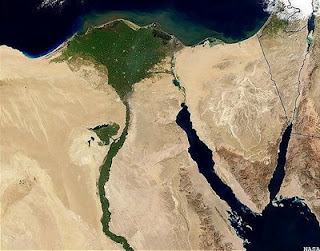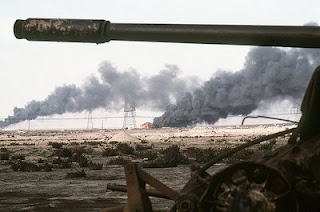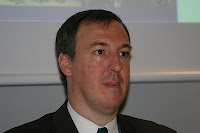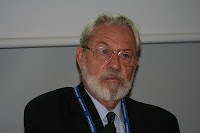-
VIDEO: Kent Butts on Climate Change, Security, and the U.S. Military
›February 5, 2009 // By Wilson Center Staff“Climate change is an important issue that can be addressed by all three elements of the national security equation: defense, diplomacy, and development,” says Kent Butts, in this short expert analysis from the Environmental Change and Security Program. Kent Butts, professor of political-military strategy at the Center for Strategic Leadership, U.S. Army War College, makes the case for considering global climate change a nontraditional threat to security and discusses how the U.S. military is reacting to a changing climate.
-
Reading Radar– A Weekly Roundup
›January 23, 2009 // By Wilson Center Staff“As long as we continue to subsidize Gaza’s extreme demographic armament, young Palestinians will likely continue killing their brothers or neighbors. And yet, despite claiming that it wants to bring peace to the region, the West continues to make the population explosion in Gaza worse every year. By generously supporting UNRWA’s budget, the West assists a rate of population increase that is 10 times higher than in their own countries,” argues the University of Bremen’s Gunnar Heinsohn in the Wall Street Journal.
In an article for the Huffington Post, Water Advocates’ John Sauer argues that we should group together waterborne diseases like diarrhea, typhoid, and cholera under the name “No-Plumbing Disease,” to help water and sanitation get the attention they deserve.
It takes a strong editor to push for stories on development issues like poverty and public health, but there is often surprisingly high interest in these stories, writes Richard Kavuma for the Guardian.Yale Environment 360 sums up President Obama’s statements on the environment in his inaugural address.
The Democratic Republic of the Congo has cancelled nearly 60 percent of its logging contracts in an attempt to end corrupt and environmentally destructive logging, report the BBC and Reuters.
“Could the crises of food, fuel and finance that we experienced in 2008 simply be three canaries in the coalmine? What if these are just the early-warning signals that our current economic system is not sustainable at a much deeper level?” asks Dominic Waughray, head of environmental initiatives at the World Economic Forum.
“A flurry of scientific field work and environmental reports have linked the spread of oil palm plantations in Indonesia to the decimation of rain forests, increased conflict between logging and oil palm interests and rural and indigenous people, and massive CO2 emissions through logging, burning, and the draining of carbon-rich peat lands,” writes Tom Knudson on Yale Environment 360.
A nickel mine in Madagascar is likely to harm biodiversity in one of the world’s most biologically unique places, reports mongabay.com.
“It is high time that India and Pakistan consider the primacy of ecological cooperation as a means of lasting conflict resolution,” argues Saleem Ali in Pakistan’s Daily Times. -
Egyptian, Sudanese Governments Stall Nile Treaty
›January 16, 2009 // By Rachel Weisshaar Ten years of negotiations over a new pact governing the use of the Nile River have come to a halt, due to Egyptian and Sudanese reluctance to relinquish their near-total control over the distribution of water resources. “The technocrats had worked out all the paper work for a good protocol but the politicians have thrown a clean piece of cloth in the mud,” Professor Afuna Aduula, chair of the Nile Basin Discourse Forum, told IPS News. “Since Egypt must consent to other nations’ use of the Nile’s water, most of the other basin countries have not developed projects that use it extensively. Not surprisingly, over the years other basin countries have contested the validity of these treaties and demanded their revocation to make way for a more equitable system of management,” explains Patricia Kameri-Mbote in “Water, Conflict, and Cooperation: Lessons From the Nile River Basin.” Decreasing water levels in Lake Victoria, the Nile’s source, have also added to upstream countries’ concerns about water allocation.
Ten years of negotiations over a new pact governing the use of the Nile River have come to a halt, due to Egyptian and Sudanese reluctance to relinquish their near-total control over the distribution of water resources. “The technocrats had worked out all the paper work for a good protocol but the politicians have thrown a clean piece of cloth in the mud,” Professor Afuna Aduula, chair of the Nile Basin Discourse Forum, told IPS News. “Since Egypt must consent to other nations’ use of the Nile’s water, most of the other basin countries have not developed projects that use it extensively. Not surprisingly, over the years other basin countries have contested the validity of these treaties and demanded their revocation to make way for a more equitable system of management,” explains Patricia Kameri-Mbote in “Water, Conflict, and Cooperation: Lessons From the Nile River Basin.” Decreasing water levels in Lake Victoria, the Nile’s source, have also added to upstream countries’ concerns about water allocation.
Despite the political tensions between many of the 10 Nile Basin riparians—which also include Burundi, the Democratic Republic of the Congo, Eritrea, Ethiopia, Kenya, Rwanda, Tanzania, and Uganda—and the critical importance of water to agriculture, health, and economic growth, analysts think it is unlikely that tensions over water will lead to war. All 10 countries belong to the Nile Basin Initiative, a ministerial-level body that has conducted the negotiations, as well as other cooperative and confidence-building measures. “While formally framed as a development enterprise, these efforts also implicitly serve as a means to prevent conflict predicated on environmental interdependence,” notes ECSP Director Geoff Dabelko in “An Uncommon Peace: Environment, Development, and the Global Security Agenda.”
Photo: Satellite image of the northern Nile River. Courtesy of Flickr user thevoyager.
-
Weekly Reading
›A study in Science warns that climate change “is likely to have more dramatic effects on global agriculture than previously predicted, leaving around half the world’s population facing serious food shortages,” reports SciDev.Net.
In an op-ed for Defense News, Sherri Goodman and David Catarious express hope that President-Elect Barack Obama will take steps to reduce climate change’s security impacts.
“Much of politics is repetitive and unproductive, but sometimes a logjam breaks. In the past two years, most politicians have ceased being in denial about climate change, greenhouse emissions, limits to water, and peak oil. All these crises reflect the deeper underlying problem: our population growth is out of control. Waiting for the population debate to begin is like waiting for the other shoe to drop,” writes Mark O’Connor for the Sydney Morning Herald.
Regional Water Cooperation and Peacebuilding in the Middle East, an Initiative for Peacebuilding paper by Annika Kramer of Adelphi Research, surveys peacebuilding challenges and opportunities around water among Israelis, Palestinians, and Jordanians.
Stephan Faris outlines the global divisions over climate change policy on Global Post, a new online-only international media site. -
‘miniAtlas’ Misses Opportunity to Map Environmental Causes of Conflict
›January 7, 2009 // By Will Rogers “Former UN Secretary-General Kofi Annan said that there can be no development without security—and no security without development,” says the miniAtlas of Human Security, a global atlas illustrating international and civil conflicts, as well as human rights abuses. The atlas explains that human security comprises the broader pillar of freedom from want (for basic necessities like food, water, shelter, education, employment, and health care) and the narrower pillar of freedom from violence. Although freedom from want is vital to sustainable development and long-term security, the atlas only maps instances where freedom from violence has been marred by inter- or intrastate conflict.
“Former UN Secretary-General Kofi Annan said that there can be no development without security—and no security without development,” says the miniAtlas of Human Security, a global atlas illustrating international and civil conflicts, as well as human rights abuses. The atlas explains that human security comprises the broader pillar of freedom from want (for basic necessities like food, water, shelter, education, employment, and health care) and the narrower pillar of freedom from violence. Although freedom from want is vital to sustainable development and long-term security, the atlas only maps instances where freedom from violence has been marred by inter- or intrastate conflict.
While the atlas openly admits its exclusion of the broader pillar of human security—which notably includes environmental issues—it nevertheless misses the opportunity to acknowledge that the environment can span both pillars of human security. Though the atlas notes that the environment can be used as a weapon of violence—by poisoning wells, for instance—it never explains the role of the environment as a cause of violent conflict—in land disputes, local conflicts over water, or by spurring climate change-induced migration.
The authors of the miniAtlas of Human Security argue that today, most violent conflicts are rooted in poverty and politics. “Poor countries, unlike rich ones, lack the resources to address the grievances that can spark armed uprisings,” the report explains, and “poor countries tend to have weak security forces and so find it difficult to deter rebellions and to crush those that cannot be deterred.” In addition, dictatorships and “anocracies—regimes that are neither dictatorships nor full democracies—are the most prone to armed conflict” and human rights abuses. Though generally speaking, both of these statements are true, there are other causes of violent conflict that are just as important and have serious implications for human security.
For instance, the environment has helped spark conflict in many parts of the world. Competition over natural resources—whether diamonds in Angola and Sierra Leone, timber in Liberia, or coltan in the eastern Democratic Republic of the Congo—has been a source of violent conflict between warlords, governments, and civilian populations. Getting policymakers to recognize that the environment is a cause of violent conflict is an essential step to preventing conflict, as well as conducting successful post-conflict environmental and disaster management. Until we recognize that the environment can increase the risk of violence, global security itself will suffer.
Photo: The Zambezi (Chobe) River borders eight African states: Angola, Botswana, Namibia, Malawi, Mozambique, Tanzania, Zambia, and Zimbabwe. In an effort to improve governance and prevent violent conflict from erupting, these eight states are working for the establishment of a commission to govern this vital water resource. Courtesy of Flickr user Mara 1. -
VIDEO: Crisis Management and Natural Resources Featuring Charles Kelly
›December 19, 2008 // By Wilson Center Staff“Governance is key. If you don’t have a competent government after the war, you’re not going to solve the problems that weren’t solved before the war because of incompetent governance,” said Charles Kelly at “Sustaining Natural Resources and Environmental Integrity During Response to Crisis and Conflict,” a November 12 event.
In this latest video from the Environmental Change and Security Program, Kelly discusses the importance of carefully planning and executing post-conflict environmental assistance, which can lead to renewed conflict if not implemented properly. He highlights ongoing post-conflict and disaster management operations in Sudan and Haiti, offering suggestions for the way forward. -
United Nations Observes International Day for Preventing the Exploitation of the Environment in War and Armed Conflict
›November 6, 2008 // By Rachel Weisshaar Each November 6, the International Day for Preventing the Exploitation of the Environment in War and Armed Conflict passes by, largely unnoticed. But as the UN General Assembly noted in 2001 when it gave the day official status, “damage to the environment in times of armed conflict”—including poisoning of water supplies and agricultural land; habitat and crop destruction; and damage resulting from the use of biological, chemical, and nuclear weapons—“impairs ecosystems and natural resources long beyond beyond the period of conflict, and often extends beyond the limits of national territories and the present generation.”
Each November 6, the International Day for Preventing the Exploitation of the Environment in War and Armed Conflict passes by, largely unnoticed. But as the UN General Assembly noted in 2001 when it gave the day official status, “damage to the environment in times of armed conflict”—including poisoning of water supplies and agricultural land; habitat and crop destruction; and damage resulting from the use of biological, chemical, and nuclear weapons—“impairs ecosystems and natural resources long beyond beyond the period of conflict, and often extends beyond the limits of national territories and the present generation.”
In a written statement issued today, UN Secretary-General Ban Ki-moon points out that although natural resources are often exploited during war, they are also essential to establishing peace:The environment and natural resources are crucial in consolidating peace within and between war-torn societies. Several countries in the Great Lakes Region of Africa established trans-boundary cooperation to manage their shared natural resources. Lasting peace in Darfur will depend in part on resolving the underlying competition for water and fertile land. And there can be no durable peace in Afghanistan if the natural resources that sustain livelihoods and ecosystems are destroyed.
As the Development Gateway Foundation’s Environment and Development Community emphasizes, “[e]nvironmental security, both for reducing the threats of war, and in successfully rehabilitating a country following conflict, must no longer be viewed as a luxury but needs to be seen as a fundamental part of a long lasting peace policy.”
Some of the United Nations’ most important contributions to illuminating the links between conflict and environmental degradation are the excellent post-conflict environmental assessments that the UN Environment Programme’s (UNEP) Disasters and Conflicts Programme has carried out in Afghanistan, Lebanon, and Sudan, among other countries. UNEP is currently preparing to conduct an assessment of Rwanda’s environment.
Photo: A Kuwaiti oil field set afire by retreating Iraqi troops burns in the distance beyond an abandoned Iraqi tank following Operation Desert Storm. Courtesy of Flickr user Leitmotiv. -
Dispatches From the World Conservation Congress: Geoff Dabelko on Wartime Environmental Protection, Post-Conflict Peacebuilding
›October 8, 2008 // By Geoffrey D. Dabelko The lawyers are out at the World Conservation Congress Forum in Barcelona. Carl Bruch of the Environmental Law Institute in Washington, DC, was one of several speakers at “Armed Conflict and Environment: Protecting the Environment During War and Improving Post-Conflict Natural Resource Management.”
The lawyers are out at the World Conservation Congress Forum in Barcelona. Carl Bruch of the Environmental Law Institute in Washington, DC, was one of several speakers at “Armed Conflict and Environment: Protecting the Environment During War and Improving Post-Conflict Natural Resource Management.”
Bruch is leading a forward-leaning initiative entitled “Strengthening Post-Conflict Peacebuilding and Recovery Through Natural Resource Management” that is collaborating with Tokyo University and the UN Environment Programme’s Conflicts and Disasters Programme to analyze cases from around the world where the environment is key to causing, extending, ending, or recovering from conflict. Bruch and his team of authors are trying to glean lessons for peacebuilding by examining natural resource management in post-conflict societies. Bruch emphasized that the goal is to provide actors on the ground who are not environmental practitioners with the practical means to integrate natural resource management into their operations. Michael Bothe, an expert on the environment and laws of war from Goethe University in Frankfurt, Germany, suggested IUCN could play a positive role in using the parks-for-peace process to establish parks as demilitarized zones. He noted that peacetime treaties often remain in effect in times of conflict, but that obligations in international environmental treaties are promotional and therefore have limited impact during war. Bothe called for more work in three areas:
Michael Bothe, an expert on the environment and laws of war from Goethe University in Frankfurt, Germany, suggested IUCN could play a positive role in using the parks-for-peace process to establish parks as demilitarized zones. He noted that peacetime treaties often remain in effect in times of conflict, but that obligations in international environmental treaties are promotional and therefore have limited impact during war. Bothe called for more work in three areas:- Passing laws that use parks-for-peace mechanisms to prevent valuable habitats from becoming military objectives;
- Clarifying how the military doctrine of proportionality of response applies to environmental damage; and
- Specifying the application of customary (i.e., traditional) law regarding environmental protection during armed conflict.
Illustrating the diversity of participants at the World Conservation Congress, questioners from Iraq, Lebanon, Pakistan, Angola, Georgia, and Germany focused on environmental damage from conflicts in their regions.
- Passing laws that use parks-for-peace mechanisms to prevent valuable habitats from becoming military objectives;
Showing posts from category environmental peacemaking.


 Ten years of negotiations over a new pact governing the use of the Nile River have come to a halt, due to Egyptian and Sudanese reluctance to relinquish their near-total control over the distribution of water resources. “The technocrats had worked out all the paper work for a good protocol but the politicians have thrown a clean piece of cloth in the mud,” Professor Afuna Aduula, chair of the Nile Basin Discourse Forum, told
Ten years of negotiations over a new pact governing the use of the Nile River have come to a halt, due to Egyptian and Sudanese reluctance to relinquish their near-total control over the distribution of water resources. “The technocrats had worked out all the paper work for a good protocol but the politicians have thrown a clean piece of cloth in the mud,” Professor Afuna Aduula, chair of the Nile Basin Discourse Forum, told  “
“ Each November 6, the International Day for Preventing the Exploitation of the Environment in War and Armed Conflict passes by, largely unnoticed. But as the UN General Assembly noted in 2001 when it gave the day official status, “damage to the environment in times of armed conflict”—including poisoning of water supplies and agricultural land; habitat and crop destruction; and damage resulting from the use of biological, chemical, and nuclear weapons—“
Each November 6, the International Day for Preventing the Exploitation of the Environment in War and Armed Conflict passes by, largely unnoticed. But as the UN General Assembly noted in 2001 when it gave the day official status, “damage to the environment in times of armed conflict”—including poisoning of water supplies and agricultural land; habitat and crop destruction; and damage resulting from the use of biological, chemical, and nuclear weapons—“ The lawyers are out at the
The lawyers are out at the  Michael Bothe, an expert on the environment and laws of war from Goethe University in Frankfurt, Germany, suggested
Michael Bothe, an expert on the environment and laws of war from Goethe University in Frankfurt, Germany, suggested 

